Exploring the Mechanist in the Fallout Series
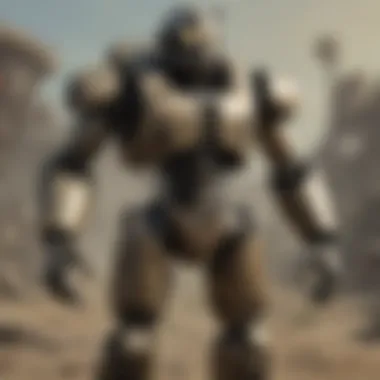
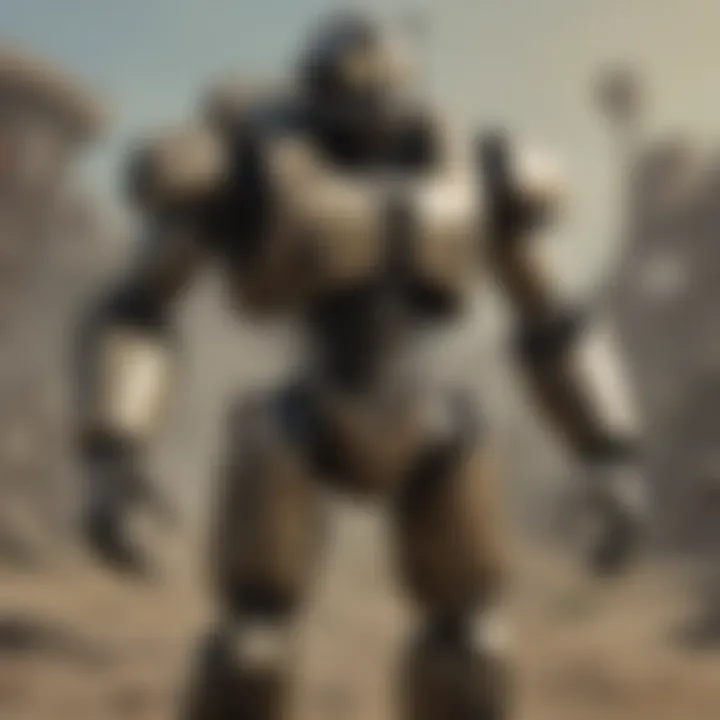
Intro
The world of Fallout is painted with shades of chaos and innovation, where survival hinges on both wit and mastery of technology. At the heart of this tumultuous landscape lies the Mechanist, an enigmatic figure who embodies the duality of mechanical prowess and moral ambiguity. Understanding this character is crucial for both veterans familiar with the series and newcomers eager to delve deeper into the narrative fabric of Fallout.
As players navigate the ruins of a post-nuclear society, they encounter various factions and personalities that shape their journey. The Mechanist stands out not just for their mechanical inventions but also for what they represent in a world constantly at odds with itself. This article aims to dissect the Mechanist’s role and significance within the broader sequences of Fallout's lore, offering insights into their motivations and the ethical implications surrounding technology.
Through a detailed exploration of the Mechanist’s backstory, their interactions with other characters, and the themes that arise from their pursuits, we invite you to reflect on the balance of progress and destruction—a concept as relevant in the Fallout universe as it is in our own world.
Lore Insights
Overview of the Fallout Universe
To appreciate the significance of the Mechanist, one must first grasp the fabric of the Fallout universe. Set in a dystopian future following catastrophic nuclear warfare, the world is steeped in decay, remnants of a once-promising civilization littered across the landscape. Societies regressed into factions often seem to run on their old habits, both socially and technologically.
Key Historical Events in the Fallout Timeline
Several key events define the lore of Fallout, shaping characters and factions:
- The Great War (2077): The precipitating event leading to the post-apocalyptic setting. Lasting merely two hours, it effectively ended the world as it was known.
- The Rise of Vault-Tec: A corporation that constructed underground vaults promising safety; ironically, these vaults became their own forms of social experimentation.
- Formation of Major Factions: Groups like the Brotherhood of Steel and the Railroad represent differing ideologies on technology and ethics, each with its own approach to the remnants of the old world.
Deep Dive into the Backstory of Major Factions and Characters
The Mechanist emerged from the fallout of these historical events. Their presence is intertwined with the Technological Utopians and the Children of the Atom—each faction reflects different ideologies on technology and the potential they see within it. Contrary to the destructive legacy of the Great War, the Mechanist advocates for mechanization as a pathway toward progress. However, this raises unsettling ethical questions regarding autonomy and the sanctity of life in a mechanized world.
"The Mechanist believes that technology, when used ethically, can lead to a more sustainable and prosperous future. Yet, in a world where trust is a rare commodity, the efficacy of such beliefs is put to the test."
As we delve deeper into the character of the Mechanist, it becomes crucial to analyze their distinct motivations, the gameplay implications of their technological advancements, and how they fit into the intricate narrative of Fallout. This journey reveals not just the allure of technological salvation but also the specter of unintended consequences that lies beneath.
Gameplay Tips and Strategies
For players looking to engage with the Mechanist insightfully, understanding underlying themes can enhance game mechanics and strategic planning. Here, we outline essential elements that could elevate your gameplay experience.
Beginner's Guide to Playing Fallout Games
Entering Fallout can be daunting, but a few tips can smoothen the transition:
- Explore Thoroughly: Every nook and cranny holds secrets and lore that add depth to the experience.
- Engage in Role-Playing: Choose your character’s backstory; it enhances immersion and personalizes your journey.
Weapon and Armor Recommendations
When facing the Mechanist, specific gear becomes crucial:
- Protectron Arm: Ideal for parrying melee attacks, with bonuses to your strength stat.
- Mechanist's Battle Armor: Not only stylish but also offers high damage resistance against energy weapons.
Tips for Efficient Resource Management
Resources are at a premium in Fallout. Here are some practical insights:
- Scrap Everything: Items that seem worthless can often provide valuable parts for crafting.
- Fast Travel: Utilize it to transport quickly between settlements once you discover the locations; this efficiency can save time and enhance resource control.
With these elemental insights in mind, navigating the labyrinthine narratives and mechanics of Fallout can become a more fluid experience. The world, rife with technological marvels and moral quandaries, awaits the discerning player eager to uncover its secrets.
Prelims to the Mechanist
The Mechanist is not just another face in the harsh landscape of the Fallout universe; rather, the character represents a crucial intersection of technology, morality, and the human condition. In a world ravaged by nuclear fallout, where survival often trumps ethical considerations, the Mechanist is a manifestation of both hope and fear. This character's story will take us through a labyrinth of dilemmas where mechanization holds the promise of protection yet raises questions about autonomy and humanity.
Understanding the Mechanist allows players to grasp the nuanced narrative depth that defines the series. The Mechanist serves as a counterpoint to a world brimming with chaos, and this duality is what makes the character vital to the overarching themes of Fallout. Furthermore, the role of the Mechanist becomes even more significant when viewed within the context of player decisions and the implications of technological advancements in a post-apocalyptic setting.
In this article, we will dissect the Mechanist’s character through layered narratives and gameplay mechanics, emphasizing elements that heighten the stakes of existence in Fallout’s universe. As we explore, readers will come to appreciate how this character spurs dialogue about technology and its breathtaking, sometimes dreadful, capabilities.
An Overview of the Character
The Mechanist is steeped in the tradition of archetypal mad scientist figures often found in literature and pop culture, yet the character is fleshed out with unique intricacies. Originally introduced in Fallout 3, the Mechanist initially appears as a superhero-esque figure dedicated to protecting the inhabitants of the D.C. wasteland from rogue robots. This conceit, however, quickly folds into a more complicated characterization that evolves through the series.
- Appearance: Clad in a metallic suit that bears an unmistakable robotic aesthetic, the Mechanist embodies what it means to merge humanity with synthetic elements. This design speaks volumes about their commitment to the technological advancements that define their actions.
- First Impression: Upon first encounter, many players are struck by the grandeur and almost theatrical nature of the Mechanist’s crusade. Their zeal and charisma set the stage for a complex exploration of right and wrong.
A captivating aspect is that the Mechanist’s journey is layered with challenges and shifting perceptions. As players delve deeper into the ongoing story, they find that the character’s motivations are tied closely to a history of loss—lost humanity, lost companionship, and perhaps in some ways, lost sanity. This interplay of emotion and ambition ultimately shapes the Mechanist's identity.
The Mechanist's Role in the Fallout Series
In the broader tapestry of the Fallout series, the Mechanist is a crucial player whose actions dynamically influence player experience and world-building. Serving as both antagonist and potential ally, the character embodies the struggle between technology as a boon or a bane. The storyline underscores the complexities of engaging with advanced robotics within a devastated environment.
Key Contributions to Fallout Lore
- Narrative Tension: The Mechanist builds a palpable tension between factions, particularly against the backdrop of the Railroad. The character’s opposition to the Railroad highlights the ethical dilemmas surrounding artificial intelligence and freedom of choice.
- Thematic Depth: Through the Mechanist, Fallout interrogates themes of control and freedom. Players are thrust into a compelling narrative that compels them to consider the moral depths of their actions. The motivations driving the Mechanist effectively encapsulate the tension between progression and regression within a collapsed world.
- Gameplay Mechanics: More than just a character, the Mechanist is tightly woven into gameplay. The use of robotic companions and enhancements affords players significant variety, ensuring that encounters feel fresh and engaging—reflecting the unpredictability of the world around them.
In summary, the Mechanist is not merely a simple antagonist; rather, they are a vital cog within the Fallout machine, representing the ongoing struggle for moral clarity in the face of existential threats. Through careful exploration of their role across the series, players gain richer insight into both the narrative and gameplay elements that have come to define this rich universe.
The Origins of the Mechanist
To truly grasp the essence of the Mechanist, one must peek into their origins within the Fallout universe. This character not only adds depth to the narrative but also reflects broader themes of technology and humanity's struggle for survival in a post-apocalyptic world. Understanding the origins of the Mechanist helps players navigate the delicate balance between embracing technological advancements and grappling with their consequences.
Historical Context in Fallout Lore
The Mechanist emerges in a wasteland littered with remnants of a once-thriving society, where technology and devastation coexist. The lore surrounding the Mechanist is essential as it places them within the context of a ruined world. The Mechanist, initially introduced in Fallout 3 through the "Mothership Zeta" DLC, becomes a multifaceted figure. They represent the height of industrial ambition—building machines to protect the weak, yet often losing sight of the essence of humanity in this quest.
In the Fallout series, the historical backdrop is rich with conflict, particularly the devastating Great War, which caused societal collapse. The Mechanist's story can be seen as a direct reflection of this chaos, exploring how people respond to trauma and loss. The character also draws inspiration from real-world technological advancements and fears related to automation, serving as a critique of blind reliance on technology to solve intricate human dilemmas.
As the series progresses, this character evolves, shedding light on differing perspectives within the wasteland. The Mechanist's historical context is not only a tale of survival but also serves as a narrative device linking the many complex threads within the Fallout universe.
Character Development and Backstory
Delving into the character development and backstory of the Mechanist reveals a tapestry woven with motives, struggles, and transformations. As a character, the Mechanist starts as a visionary—someone captivated by the potential of machines as aid in a mournful world. At the same time, they grapple with personal loss and trauma, which shapes their view of technology as both a savior and a curse.
The transition from a hopeful engineer to a faction leader delineates the impact of certain events in their past. Perhaps at first, they wield their technological prowess to build robotic allies, aiming to shield the vulnerable from the harshness of the Wasteland. Over time, however, this vision becomes clouded, leading to increasingly radical strategies that betray the very people they set out to protect. This conflicting nature of ambition showcases the darker aspects of their personality.
Moreover, the Mechanist's backstory touches on important themes such as responsibility, innovation, and the quest for power. Players learn how their once-bright ideology spirals into a fixation on control and technocracy. By delving into the character's past, players not only gain insight into the Mechanist's psyche but also reflect on their journey throughout the Fallout series. In doing so, it empowers players to navigate their own decisions and alliances, weaving their narrative into the complex fabric of the Fallout universe.
"The Mechanist stands as a reminder that in the pursuit of a brighter future, one can easily lose their way, becoming part of the very machine they sought to tame."
Ultimately, the origins of the Mechanist invite a profound exploration of both personal narrative and the overarching themes that permeate the Fallout series, compelling players to ponder the roles of technology and ethics in their own gameplay.
Mechanization in Fallout
Mechanization is a cornerstone concept in the Fallout universe, encapsulating the intersection of survival, technology, and moral quandaries faced by characters and players alike. This segment digs into the depths of mechanization, revealing its various layers and implications throughout the series. The Mechanist, as a pivotal figure, embodies this interplay, using technology both to protect and to control.
The importance of mechanization in Fallout hinges on several key elements:
- Survival Strategy: In the harsh environments of the post-apocalyptic world, mechanization often becomes synonymous with survival. Enhancements such as robotic companions or fortified shelters not only shield against external threats but also cater to the basic needs of the game’s survivors. Players frequently find themselves weighing the benefits of deploying advanced tech versus relying on traditional methods.
- Narrative Depth: The way mechanization is woven into the narrative provides fertile ground for character development. The Mechanist's journey illustrates the ethical dilemmas faced when technology becomes a part of one's identity. It raises questions about who we become in the quest for safety—are we improving humanity or risking our very souls?
- Conflict and Control: Mechanization often sparks rivalries and conflicts, most notably seen in the tension between factions like the Railroad and the Mechanist. Such confrontations highlight how advanced technology can both liberate and enslave, emphasizing that the morality of technological progress is rarely black and white.
In essence, mechanization in Fallout is more than just an abstract concept; it forms the backbone of the game's thematic exploration, pushing players to confront their beliefs about technology and authority.
Thematic Exploration of Technology
The exploration of technology within the Fallout universe goes beyond mere mechanics; it confronts players with profound philosophical inquiries. The narrative doesn't paint technology as inherently good or bad. Instead, it positions technology as a mirror reflecting humanity’s choices.
Technology serves several thematic functions:
- Dual Nature of Innovation: Innovations in the Fallout world often have unintended consequences. For instance, while the shiny new Sentry Bots have advanced capabilities, their very existence can lead to oppressive environments that echo military paranoia.
- Impact on Identity: Characters like the Mechanist show how technology blurs the line between human and machine. This raises the question of what it means to be human in a world where one can augment body and mind.
- Ethical Dilemmas: Central to many Fallout narratives is the idea of choice. Players are faced with moral dilemmas surrounding the use of technology. Should they adopt it uncritically, or should they consider the broader implications?
To sum up, the thematics surrounding technology in the Fallout series is rich and varied, demanding deeper reflection from players as they navigate their post-apocalyptic universe.
Robotic Enhancements and Their Implications
Robotic enhancements in the Fallout universe embody both opportunity and danger. They allow characters to gain physical advantages and cognitive boosts, shaping gameplay mechanics in unique ways.
- Gameplay Enhancements: Robotic companions, like Codsworth or the unique Mister Handy models, enhance player experience through strategic advantages. They offer fire support, perform tasks, and can even level up, providing practical benefits that make them indispensable allies.
- Physical and Psychological Costs: However, the enhancement comes with its own baggage. There are narratives of individuals who lose their humanity or sense of self through excessive mechanization. The more one leans on technology, the more they risk isolation from their human counterparts. This is evident in the Mechanist, whose motives reveal a complex relationship between technological dependence and the search for power.
- Societal Impact: The proliferation of robotic technology triggers societal shifts. Many factions utilize robots for various purposes, leading to thematic elements such as labor exploitation or rebellion. The implications of having robots as laborers play heavily into the narrative of class struggle within the game.
"Technology, when left unchecked, can become a weapon of oppression or a means of liberation—it's all a matter of choice and responsibility."
In this world, the choice of whether to embrace robotic enhancements brings forth significant implications not just for individuals, but for the society at large, reflecting the age-old tension between progress and ethics.
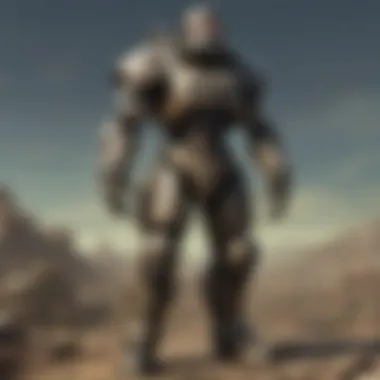
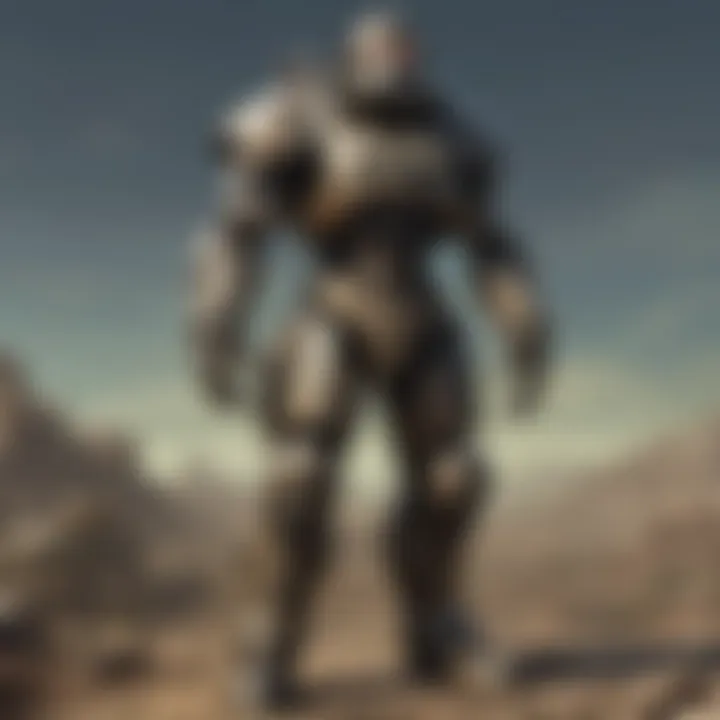
Through the nuanced exploration of mechanization, Fallout salvages much more than just battles and quests. It provokes considerations of what it truly means to survive in a world where the line between humanity and machinery grows increasingly thin.
Gameplay Mechanics Related to the Mechanist
In the Fallout universe, the Mechanics associated with the Mechanist represent more than just a set of gameplay features; they encapsulate the essence of survival in a hostile world driven by technology. Key features related to the Mechanist directly affect how players engage with combat, strategy, and the wider implications of machinery in the narrative. Understanding these mechanics is crucial for players looking to navigate the challenges presented by both human and robotic foes.
Combat and Strategy Considerations
Combat within the world of Fallout achieves a new level of complexity when the Mechanist enters the fray. This character and their robotic creations offer a multifaceted approach to strategy that blends traditional firefights with tactical decision-making. Here are a few elements that stand out:
- Robotic Minions: The Mechanist’s creations act as both allies and enemies, depending on player choices. These robotic enemies, often armed with advanced weaponry, can turn the tide of a battle, making engagements more significant and complex. Players need to recognize how to counteract these threats effectively.
- Environmental Interaction: Battles can shift based on surroundings. Certain areas might have components to exploit, like terminals to hack into or scripts to break down enemy systems. This layer encourages players to think outside the box and utilize the environment rather than relying solely on brute force.
- Upgrades and Abilities: Engagements against the Mechanist's forces also bring upgrades into the picture. Players may find themselves required to enhance their own weapons and armor to match the escalating threats posed by advanced robotic adversaries. Making wise choices regarding modifications can shape the player's style of combat.
Ultimately, the Mechanist's influence on combat mechanics invites players to employ diverse strategies, requiring them to think critically about tactics and resource management.
Customization Options with Mechanist Technology
Customization is another significant aspect when engaging with Mechanist technology. The opportunity to tailor both weaponry and robotic companions allows players to create unique combat experiences. Here’s how:
- Weapon Modifications: Players can enhance their weapons using Mechanist's technology to adapt them for various combat situations. From increasing fire ranges to adding explosive rounds, the sky's the limit when it comes to creative weapon builds.
- Robotic Companion Customization: Players can recruit and customize robotic companions, employing various traits and upgrades that suit gameplay preferences. Options may include:
- Crafting and Schematic Gathering: The Mechanist storyline encourages players to gather resources and schematics to unlock new modifications. Players might find themselves rummaging through dilapidated buildings or trading with NPCs to expand their crafting abilities.
- Combat-oriented designs: Enhancing armor and weaponry for direct confrontation.
- Utility-focused upgrades: Improvements like pathfinding abilities or stealth capabilities, allowing for covert missions or effective support roles in battle.
Customizing technology as part of your gameplay not only enhances personal style but also affects overall success in survival.
The Mechanist in Fallout
Plot Involvement and Key Missions
The Mechanist shines in Fallout 4, not just as a figurehead, but as a pivotal character woven deeply into the fabric of the game's narrative. Bringing a twist to the standard villain archetype, the Mechanist is more than just a foe; they represent the complex intersection of technology and morality. Players are thrust into the conflict between the Mechanist and The Railroad, which sets the stage for moral dilemmas and critical choices throughout the quests.
One of the standout missions involves a series of encounters where players must navigate the challenges of rescuing kidnapped Synths while unraveling the Mechanist's motivations. The primary mission, "The Mechanist's Lair", is particularly engaging—players infiltrate the lair to dismantle dangerous robots and gather intel on the Mechanist's larger plan. The mission encapsulates the tension between the mechanization of society and the underlying ethical ramifications of treating Synths as mere tools.
Every action taken within this mission leaves a mark, resonating with themes of autonomy versus control. The Mechanist’s antagonistic actions, justified by a perceived need for protection, force players to consider their own choices deeply. Thus, the Mechanist serves as an embodiment of the philosophical conflict inherent in the technological advancement seen in the Fallout universe.
Player Choices and Consequences
The choices players make surrounding the Mechanist's storyline reverberate throughout Fallout 4, providing a rich tableau for moral contemplation. For instance, deciding whether to side with the Mechanist, The Railroad, or even the Institute presents differing outcomes. Each path carries unique implications for the Synths, as well as the overarching tension between human and Synth rights.
Alternate endings come into play depending on how one navigates the intertwining narratives:
- Aligning with the Mechanist can lead to a new status quo, where robotic entities become an integral part of the Commonwealth's dynamics, emphasizing control and order.
- Supporting The Railroad results in a situation where Synths gain autonomy, but this choice could provoke conflict with the Mechanist and those who support their vision.
"In a world ravaged by fallout, the battle lines drawn by technology challenge us to reconsider what it means to be human.”
Additionally, players bear witness to the consequences of their actions through dialogues or specific developments in subsequent quests. Helping Synths escape from the Mechanist could yield rewards, while failing to protect them may lead to emotional weight as the player encounters their tragic fates later.
Ultimately, Fallout 4 utilizes the Mechanist to enrich player agency, making every choice feel significant, pushing players to grapple with their values in a harsh, post-apocalyptic milieu.
Interactions with Other Characters
Understanding the Mechanist's interactions with other key figures in the Fallout universe is vital to grasping their role and impact within the series. The relationships they form pave the way for complex narratives, pivotal in gameplay and story progression. This section delves into two significant dynamics: the Mechanist versus the Railroad and the various alliances and rivalries that shape their character.
The Mechanist vs. The Railroad
The clash between the Mechanist and the Railroad showcases a profound ideological conflict. On one side, the Mechanist embodies the belief in the supremacy of technology, using it as a means of control and domination over the wasteland’s remnants. In stark contrast, the Railroad champions freedom, particularly for Synths, the advanced robots designed to mimic humans closely. This delicate interplay epitomizes the duality of technological progress—while it can lead to survival, it may also foster oppression.
Both factions view the world through a lens that justifies their methods. The Mechanist’s unwavering commitment to their robotic army creates a formidable threat to the Railroad's mission, leading to a tense and dangerous rivalry. Players are caught in the middle of this conflict, compelled to navigate their decisions carefully. They must ponder whether to support a mechanized world that promises security at the cost of freedom or to align with a group focused on liberation, albeit through guerrilla tactics. The ramifications of these choices ripple throughout the game, affecting not only immediate outcomes but also the broader narrative.
Players can often find themselves questioning whether blind adherence to technology is a boon or a curse. This dilemma forces a critical examination of the Mechanist's philosophy, making their opposition to the Railroad all the more compelling.
Alliances and Rivalries
Beyond the rivalry with the Railroad, the Mechanist's relationships with other factions add layers of complexity to their character. The Commonwealth is teeming with diverse groups, from the Minutemen, who aim to restore order, to the Institute, the very source of the Synths that the Railroad seeks to liberate.
- Alliances:
- Rivalries:
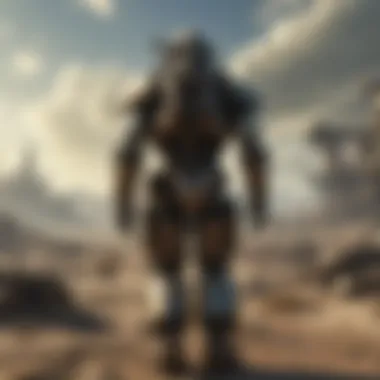
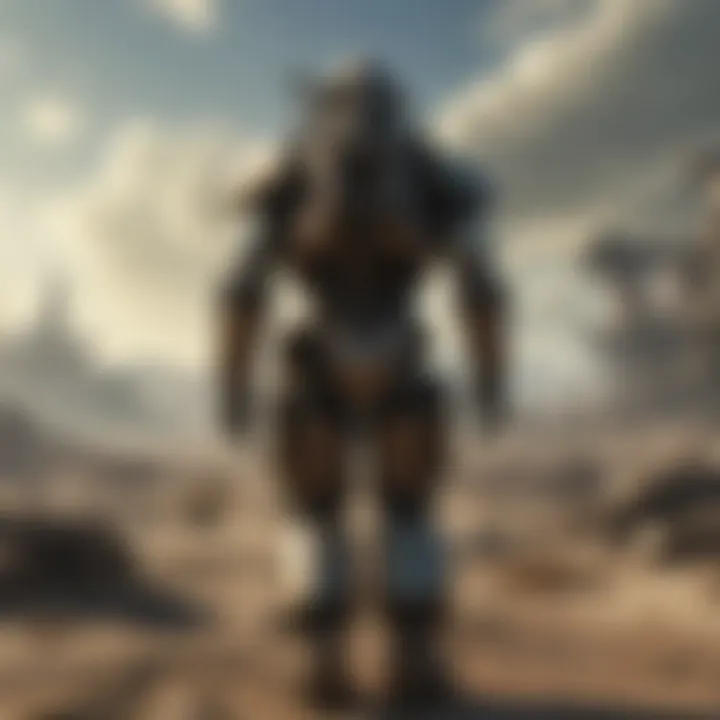
- Institute: The bond with the Institute runs deep, as both entities share a common goal: advancing technology for survival. However, cooperation can be fraught with tension, given differing philosophies about humanity’s future.
- Minutemen: A potential alliance here may arise out of necessity rather than shared beliefs, as both parties understand that a unified front against emerging threats can shift power dynamics in the Commonwealth.
- Brotherhood of Steel: The Brotherhood often sees the Mechanist as a dangerous figure due to their obsession with robotics. This rivalry can quickly escalate into open conflict, given the Brotherhood's rigid ideology against technology that lacks a human touch.
- Commonwealth Citizens: Individual NPCs often voice concerns about the Mechanist's influence, shaping public perception and further emphasizing the existing divide between those who embrace technology and those who fear its consequences.
The interplay between alliances and rivalries serves to enrich the narrative, providing insights into the Mechanist's motivations and the broader ethical concerns surrounding mechanization. Players must navigate these relationships carefully, recognizing that each choice carries weight in shaping their version of the Commonwealth and the fate of its inhabitants. The art of negotiation, betrayal, and strategic alliances becomes essential in a world where trust can be as scarce as common sense.
Philosophical Considerations
The philosophical underpinnings of the Mechanist in the Fallout universe strike a resonant chord that extends beyond the game itself. This aspect is crucial as it invites players to reflect on fundamental questions surrounding technology, ethics, and humanity. The Mechanist serves as a lens to examine how mechanization can shape not only the wasteland but also the values and decisions of the individuals navigating it. This exploration will delve into the ethics of technological control and the delicate balance between survival instincts and the potential for dehumanization.
The Ethics of Technological Control
At its core, the Mechanist represents the duality of innovation and ethical ambivalence. The character embodies the complexities of wielding technology as both a means of salvation and a potential weapon of mass subjugation. As players engage with the Mechanist, they may find themselves grappling with questions such as:
- What responsibilities come with technological advancement? The ability to create, modify, and control machines can lead to significant power, but with that power often comes a moral burden.
- Is there a point where advancement becomes oppression? As players observe the Mechanist's interactions with other factions, they may ponder whether using advanced robotics for control becomes a form of tyranny.
- How does this reflect our real-world relationship with technology? The Mechanist's journey can remind us of the ethical dilemmas we face today—balancing innovation against the potential harm it could cause to society.
The Mechanist asks us to consider the bigger picture of technological progress. Are we building towards a brighter future, or are we unwittingly crafting chains for ourselves?
Survival vs. Dehumanization
In the relentless struggle for survival in the harsh landscapes of Fallout, the Mechanist illustrates a poignant warning about the fine line between utilizing technology to stay alive and losing one’s humanity in the process. Players must navigate choices that can veer dangerously into dehumanization as they grapple with the proliferation of mechanization.
Consider the following dilemmas:
- Are robotics merely tools, or do they start to replace human connections? Players might find themselves reflecting on the tension between efficiently executing tasks and fostering meaningful relationships.
- Does the pursuit of survival diminish our moral paradigm? The Mechanist's actions raise uncomfortable questions about sacrificing ethics on the altar of survival.
- What are the long-term consequences of reliance on robotic companions? It’s one thing to use machines for convenience and protection, but what happens when those machines supplant your ability to empathize or connect with others?
As players traverse the wasteland, they must confront whether their survival strategies lead to empowerment or whether they initiate an inexorable slide toward dehumanization.
"The greatest tragedy is not the loss of our lives in the wasteland, but the loss of who we are in the name of survival."
As we wind through the intricate web of ethical considerations that the Mechanist represents, this section underscores the need for introspection. It challenges both seasoned players and newcomers alike to confront the ramifications of mechanization on the human experience itself, weaving a richer narrative into the broader Fallout tapestry.
Fan Reactions and Cultural Impact
The character of the Mechanist in the Fallout universe has evoked diverse reactions among fans, and understanding this aspect sheds light on the significance of mechanization within a post-apocalyptic narrative. Fans engage with the Mechanist not merely as a character but also as a representation of broader themes related to technology and morality. The discussions surrounding the Mechanist reveal the depth of players' connections to the series and highlight how they perceive the role of technology in their own lives, reflecting a blend of admiration, criticism, and philosophical contemplation.
Community Discussions on the Mechanist
In online forums and gaming communities, the Mechanist tends to be a hot topic, often debated intensely among players. These discussions frequently revolve around the ethical implications of the character's mechanized vision for the wasteland. Many fans express admiration for the Mechanist's intelligent use of technology to create robotics that could potentially uplift society. However, others caution about the risks of dehumanization that come with technology's rapid advancement.
Players often cite moments in the game where choices lead to ethical dilemmas. For example, the quest "A New Threat" showcases the Mechanist's efforts in arming robots for protection, which some players see as benevolent, while others interpret it as a form of control that mirrors real-world fears about technology. Comments on platforms like Reddit emphasize this duality:
"The Mechanist’s vision is great on paper, but it makes you question if we are losing our humanity in the process."
Engagement with the character also highlights community creativity, with fan art and fan fiction emerging as popular ways to explore the Mechanist's persona. In these creations, fans delve into the character's motivations, pondering whether the Mechanist's journey is one of innovation or obsession.
The Mechanist in Fallout Merchandise and Media
The impact of the Mechanist is not limited to in-game discussions; it extends into merchandise and other media. Various collectibles, such as action figures and posters, showcase the character in dramatic poses, symbolizing their dual role as hero and villain. The merchandise often reflects the design aesthetics found within the game, including the sleek lines and intricate designs of the robotic companions associated with the Mechanist.
Moreover, the Mechanist has been featured in expanded lore, such as comic adaptations and short stories. These media explore the character’s backstory and motivations in further detail, allowing fans to engage with the material in new ways. Some consider these adaptations essential for fleshing out the character, as they reveal layers of ambiguity in the Mechanist's philosophy.
In summary, the attachment of fans to the Mechanist illustrates the character’s complex role in the Fallout narrative landscape. From the candid discussions on platforms like Facebook and Reddit to the vibrant merchandise, the Mechanist inspires a wide array of reactions that probe the intersection of technology, morality, and human identity. The ongoing examination of this character not only enriches the Fallout experience but also invites players to reflect on their own interactions with technology in the real world.
The End
The Mechanist stands as a notable character within the expansive Fallout universe, inviting an exploration not only of their role in the overarching narrative but also the profound implications surrounding mechanization itself. This article has dissected various angles, examining the development of the Mechanist, interactions with other characters, and the ethical quandaries posed by the use of technology in survival contexts.
Reflecting on the Mechanist's Legacy
The legacy of the Mechanist is multifaceted. First and foremost, the character serves as a poignant reminder of the potential dark side of technological advancement. Their motivations, rooted in a desire to control and unify humanity through machines, reflect a conflict that is increasingly relevant in today's society. As advancements in automation and artificial intelligence surge, the Mechanist reminds us to tread carefully. The character intertwines with themes of freedom, choice, and control—which players face in various gameplay scenarios. Thus, the Mechanist's narrative transcends mere fiction, provoking thoughtful discussions among players and fans regarding the nature of technology in their lives.
Notably, community discussion platforms like reddit.com have seen a surge in conversations dissecting the moral implications of mechanization as they relate to the Mechanist. Discussions often pivot around whether such technological reliance enhances humanity or erodes our very essence. The duality captured through the Mechanist’s actions and philosophies leads many to question their engagement with machinery, sparking a broader contemplation of how technology shapes identity and society.
The Future of Mechanization in Fallout
Looking ahead, the landscape of Fallout promises further exploration of mechanization themes. With each new game installment, players will likely encounter innovative takes on how technology intertwines with the human experience. The Mechanist sets a precedent that could easily evolve in future narratives. Imagine a scenario where the balance between human autonomy and technological integration is further pushed to its limits.
Players should anticipate potential new characters reminiscent of the Mechanist, perhaps advocating for mechanization as means of survival in a harsh world, or conversely, as a force that threatens the very fabric of human culture. To foster rich gameplay, developers may also draw on real-world advancements in robotics and AI, challenging players to consider their own relationship with technology in light of the Mechanist’s story.
"The Mechanist's story is not just about robots and machines; it's a lens through which we explore our hopes and fears with technology."
As conversations about ethics in technology seep into the gaming sphere, the Fallout series continues to resonate. Each iteration will potentially demand reflection on whether we are steering towards a future where mechanization dominates or where humanity finds harmony within its intricate machinery. The Mechanist, then, isn’t merely a character; they are a symbolic representation of our evolving dialogue with technology, posing vital questions that linger long after the console is turned off.







